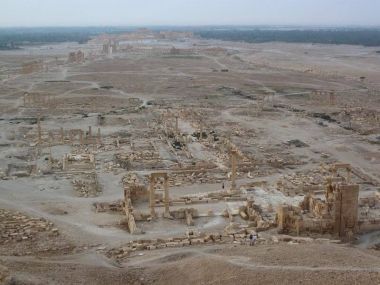ISIS kill 26 soldiers near ancient city of Palmyra
ISIS militants killed 26 Syrian soldiers near the city of Palmyra on Monday, according to a monitoring group, following days of advances by government forces backed by Syrian and Russian air cover.

Russian President Vladimir Putin said last week that the Syrian army would soon recapture Palmyra from Islamic State, which has held the desert city for nearly a year.
The Britain-based Syrian Observatory for Human Rights said the fighting took place about two miles west of Palmyra.
It was not possible to independently verify the death toll. Syria's state news agency SANA said the army and allied forces, backed by the Syrian air force, carried out "concentrated operations" against ISIS around Palmyra and the Islamic State-held town of al-Qaryatayn, about 100 km further west.
After more than five months of air strikes in support of Syrian President Bashar al-Assad, Putin announced the withdrawal last week of most Russian forces.
But Russian planes have continued to support army operations near Palmyra, according to the Observatory and regional media, and Putin said on Thursday he hoped that the city would soon fall to the Syrian government.
"I hope that this pearl of world civilization, or at least what's left of it after bandits have held sway there, will be returned to the Syrian people and the entire world," he said.
Palmyra's capture in May 2015 was considered a devastating blow to the region's cultural history. Most of the site dates back to the first and second centuries when the area was under Roman rule, and it is a UNESCO World Heritage site.
The city's Arch de Triumph was blown up by militants not long after they overran Palmyra, and ISIS released a video purporting to show 25 Syrian soldiers being killed by jihadists as young as 13 or 14 years old in the city's amphitheatre.
Syria's antiquities chief, Maamoun Abdulkarim, said ISIS' control of Palmyra represented "the fall of a civilisation".
"Human, civilized society has lost the battle against barbarism. I have lost all hope," he said last year.
In addition to its symbolic value, Palmyra is considered a prize by militants because of its strategic position. It is on a highway linking mainly government-held western Syria to Islamic State's eastern stronghold.
Additional reporting by Reuters.











